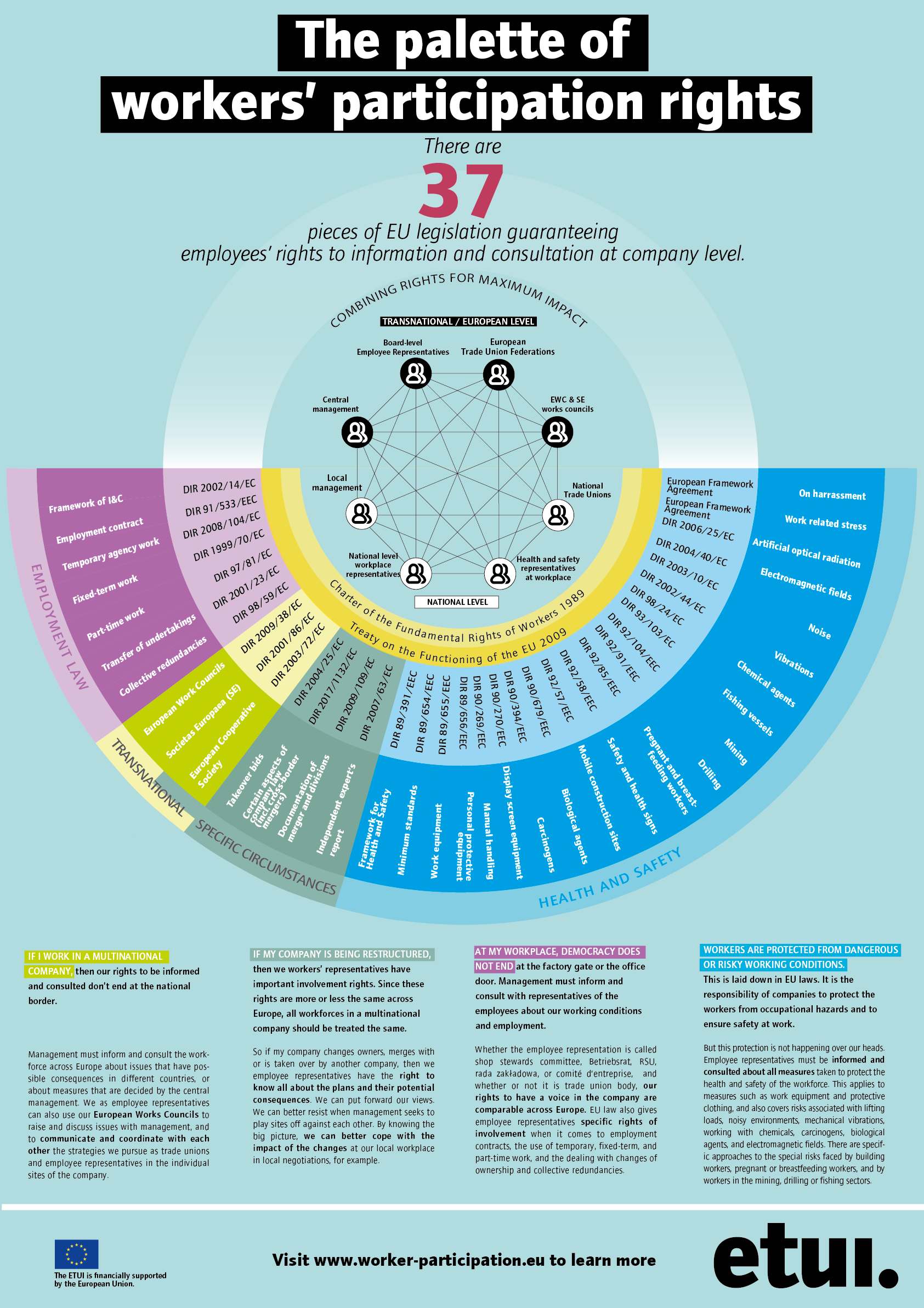The right to information and consultation is anchored:
- as a basic democratic right, in the EU Treaty & the Charter of Fundamental Rights of the EU (Art. 27 & 28).
- in the European Social Charter of the Council of Europe (Art. 21) and in the European Convention on Human Rights (Art. 11 ECHR).
- internationally in a series of ILO level instruments.
- in more than 35 EU Directives providing information and consultation rights.
Workers’ rights to information, consultation and participation are currently some of the most comprehensive in the EU legislative body. However their enforcement and their effectiveness vary drastically across the EU.

Democratic involvement and participation of workers and oversight in their workplace. It’s anchored in fundamental rights to join a trade union, to represent and defend workers’ interests. It’s also necessary to manage a just, sustainable and inclusive transformation of the world of work in times of globalisation, digitalisation and green transition.
Labour is not a commodity, and workers and their representatives protect and promote their rights and interests in the decision-making processes of companies. Democracy at work provides sustainable and balanced corporate governance. It allows companies and public services to perform better and be more innovative. It ensures better working conditions, better paid and more motivated workers, and a higher labour force participation. Democracy at work fosters inclusion and equality in the workplace, as well as in society.
The ETUC is fighting for workers’ representatives
- to be informed & consulted,
- to have meaningful and timely discussions with management at all relevant levels,
- to be actively involved in the decision-making process before any important decision by management is made.
- To be represented gender-equally in company boards.
The ETUC calls for a new framework for information, consultation and board-level representation rights for European company forms and for companies making use of EU company law instruments enabling company mobility, establishing minimum standards for worker involvement.
A new horizontal framework aims at permanently securing a high standard of rights in existing and future EU legislation. It applies in particular to cross-border situations where the national laws cannot be exercised in a coordinated and equitable way. The new framework would become the single reference on information, consultation and board-level representation for all European company forms (such as SE, SCE). It should define binding standards and design ambitious subsidiary requirements, which apply as fallback provisions if no agreement is reached or if the parties wish so.
The Directive should introduce an obligation to put in place a system for workers’ representation in the board. This can either be the board of directors (for one-tier systems) or supervisory boards (for two-tier systems). This Directive has indeed no vocation to regulate companies’ board structure.
The call for a new legislative framework is part of the ETUC More Democracy at Work project. Don’t hesitate to have a look at our leaflet for further information.
Globalisation & Internationalisation of the European labour market have put workers’ rights to information, consultation and participation more and more under attack.
For example the 2019 Company Law Package enabled cross-border company mobility while protecting stakeholder interests. Several loopholes and inconsistencies remain or have been newly created in the new legal package. Namely, it has failed to:
- improve worker involvement rights,
- strengthen procedures to avoid tax evasion,
- reduce the potential for fraud through online company foundations.
In addition, the COVID-19 crisis has accelerated corporate restructurings in almost all sectors of the economy. This has far-reaching impacts on the labour market. A recovery after the pandemic must be sustainable and socially fair. It is now time – more than ever – to strengthen democracy at work.
Lately, the European Parliament adopted a Report on Democracy at Work including the ETUC's demands on a new framework directive on workers' information, consultation and board level representation and a revision of the European Works Council Directive.
